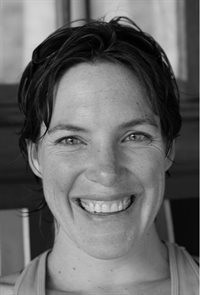 The Marshall Institute’s Senior Lecturer in Practice Kerryn Krige is about to graduate with her PhD. Here she reflects on how her experience changed her view of social entrepreneurship in South Africa.
The Marshall Institute’s Senior Lecturer in Practice Kerryn Krige is about to graduate with her PhD. Here she reflects on how her experience changed her view of social entrepreneurship in South Africa.
What does social entrepreneurship look like in South Africa?
When I started my PhD, I really thought I knew the answer. I had written a book about social entrepreneurship, mapped the eco-system and was immersed in the field. This was going to be a quick study – two years? Maybe three? As it was a process of working backwards, to confirm the result.
My PhD has taught me a few things. Not just, that I have an unrealistic concept of time, (something I know, but ignore), but importantly that it is in this moment of knowing, that everything unravels. When you think you know, is really the red flag, that you don’t know.
So what did I learn?
My PhD study changed everything for me. I was luckily to be part of a team travelling the country to explore what social entrepreneurship looks like in South Africa. We deliberately pushed out, outside of the urban, university narrative that I was so much a part (and champion) of, to identify social entrepreneurs, to find out how they experienced their world and then to explore what they were doing about it.
I learnt that we had adopted a western view of social entrepreneurship – the hybrid model that blends for profit and not for profit principles – and we transplanted that to our South African eco-system, without question. In doing so, we ignored our inequality, the complexity of our poverty, the reality of our spatial exclusions, the nuance of our multi-cultural identity.
I have very much been part of that social enterprise narrative. But even with my newly critical eye, I appreciate what this western framework gave us: a start point to explore blended models of social and economic value, and a conceptual legitimacy to do so.
But somehow this start point had become our truth.
So, I learnt that my business-school obsession with legal form, and organisational structures is misplaced. Because this automatically frames social organisations as formal entities, and automatically excludes that they are likely to be informal – either in structure or (and this is even more important), in nature.
I learnt that organisations are largely registered, and do identify as something – a co-operative, a non-profit, a limited company, a social enterprise. But this doesn’t mean that they act within the bounds of that registration. This introduced to me the value of alignment with rather than compliance to regulation. And so the much touted hybridity of social entrepreneurship is not so much in organisational structure and form, but rather in nature. For us as policy-makers, this was profound.
And yet, how ironic. The majority of enterprise activity across the African continent is informal – so why have we been so obsessed with thinking social entrepreneurship organisations are any different? By importing a truth of what social entrepreneurship was, came with blinkers that allowed me to blithely ignore what it could be, in our particular context.
I learnt that we had adopted a western view of social entrepreneurship – the hybrid model that blends for profit and not for profit principles – and we transplanted that to our South African eco-system, without question.
And so I was forced to interrogate what informal really means. In the context of social entrepreneurship, informality really is a way of working. These are micro-organisations, run by one or two people, who respond to pressing needs in their community. As a researcher, it was hard to code the scope of the work that they do, against the accepted sector definitions that are commonly applied. Mostly, because they seldom do just one thing. The creche, is also the community food garden, which houses the local spaza shop, next to the hair salon, which is the site of outreach for elderly care, and support for people with disabilities. There really is no box on the form that encompasses this approach.
And informality also determines how these organisations function. They don’t rely on large grants, or bank loans or corporate social investment. Instead, they are deeply embedded in the support structures of their communities. Financing comes from religious institutions, tribal networks, or through relational structures such as stokvels and other savings schemes. They fund and finance their social work themselves, or have friends and family as ‘investors’ – creating a closed circle of support. Crucially, their approach to finance lacks diversity, in that they rely on single sources of financing, rather than having a mix.
Theoretically this has consequences, with overtones of Granovetter’s strength of weak ties theory. Granovetter argues that close (i.e.: strong) relational networks are detrimental as they bind the individual and organisation to that community, limiting their access to information, opportunity and growth. These are relational shackles.
There are profound strengths to being tied to your community. The social organisation can be responsive, adaptive and as we saw in this study, are trusted. The value of trust cannot be underestimated, not just because one of the consequences of inequality according to 2019’s Human Development Report, is growing distrust. Considering South Africa’s inequality, that social entrepreneurship organisations build, rely and relay trust is important. It highlights the intrinsic value they bring – over and above the social mission they deliver on – in holding the fabric of our society together. It also forces us to look at how we design interventions that support social entrepreneurship, by asking ourselves what it is we can do to strengthen the systems that underpin trust, so that we can support our social enterprises and entrepreneurs to be trusted.
This currency of trust also challenges our narrative of scale. If social organisations are bound to the communities that they serve, not just in the nature of the services they provide, but because this is their source of income, and market access, then are we jeopardising the value that the organisation brings by encouraging it to grow outside of the ties of that community?
I believe that for our micro, community-embedded enterprises (which make up the majority) we need to rethink our focus on seeing their success through the lens of expansion and reach.
If we want to better support social organisations in the South African (and I would argue, the African) context, then we need to acknowledge that these organisations first require support to be sustainable and stable, and to then carefully consider the types of expansion that can occur, that don’t threaten the intangible but valuable threads of trust. Trust once broken, is hard to rebuild.
What does all of this mean?
For my work in social entrepreneurship and the social and solidarity economy sector, it has forced me to profoundly rethink my truth. I come out of this process highly uncertain but curious to learn more. My toes curl when I remember the person I was, glib with my knowledge and so certain of my framing and understanding. At the same time, I miss the confidence I had. It is a strange thing to be in the classroom, with more questions than I have answers.
There is a frustration.
At first this was at the dominance of the western narrative in our interpretation of social entrepreneurship. But increasingly I see how misplaced this is. Would we be having this conversation on social entrepreneurship, if there wasn’t the gravitational pull of this central conceptual narrative? Frederik Claeyé, who wrote one of our defining articles on social entrepreneurship in South Africa, described our knowledge of social entrepreneurship as Terra Incognita, the great unknown. I wrote in 2018 of our journey to Terra Firma, or dry land. But I realise we are still in the unknown, because we ask the wrong questions, of the wrong people. Networks are important, but we must also remember how limiting they can be if they don’t meaningfully reach out of the established narrative, and seek out people who are outside of their orbit. In the field of social entrepreneurship we champion the exemplar social entrepreneurs who are of course, doing wonderful work, building and growing their organisations. But it is important for us to remember that they are the 1%, and we design systems, support packages and policies that suit this reality, at the expense of the other 99% who are micro, informal, highly localised, and therefore diverse and hard to reach.
So. Now what? Well. When you start a process with a question – what does social entrepreneurship look like? And you come out, with no answer other than a profound challenge to your own belief-system, you have to keep on questioning.
I believe we urgently need to explore African concepts of social entrepreneurship and the social and solidarity economy. I think we will find that these ‘different’ schools of thought have much in common, particularly when you consider how informal and localised social entrepreneurship is, with its trust-foundations.
I am grateful that as a side PhD project, we established the African Network of Social Entrepreneurship Scholars, which has grown from zero to 260 members in five years, representing a footprint of curious scholars and students, focused on teaching and studying social entrepreneurship. And that we have networks like @EMES to turn to, who embody principles of solidarity and action, and show how to keep pushing the boundaries of what is known. That the policy work has accelerated at a pace we just did not predict in 2019, gives the sector political will and institutional momentum that must be harnessed. My wish, is that we keep pushing the frontiers of the conversation, so that we continue to work on building our narrative – South African and African, of what social entrepreneurship looks like.
When you start a process with a question – what does social entrepreneurship look like? And you come out, with no answer other than a profound challenge to your own belief-system, you have to keep on questioning.
In a few weeks I graduate. I will be a doctor and introduced as an expert in social entrepreneurship. But there is no expertise, only questions, and a keen curiosity to keep exploring, to tailor our knowledge of what social entrepreneurship looks like, so that we can better know our South African, and African, narrative.




